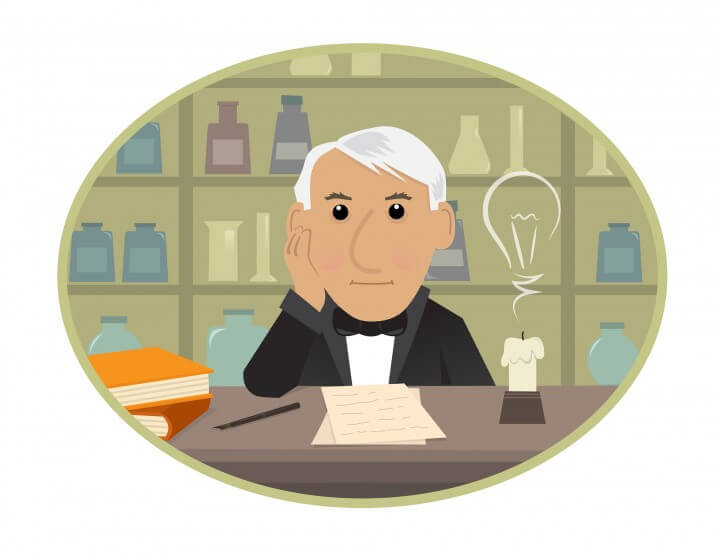Thomas Edison was an American inventor and businessman who made many contributions to the world. He is most widely known for his invention of the light bulb, but was also the inventor of the phonograph. He has been called “The Wizard of Menlo Park” and was one of the first inventors to add mass production to the process of invention. He holds 1093 U.S. patents in his name, as well as many other patents in the United Kingdom, France, and Germany.
Thomas Edison was born in Milan, Ohio and raised in Michigan. He was the last child born in his family of seven. Edison was not unlike any other child in school; his mind often wandered to other places and his teacher was heard calling him “addled.” His mother took him out of school and began teaching him herself through home school. When Edison was young he had a bout of scarlet fever and recurring untreated middle ear infections. This is believed to be the cause of his deafness, although Edison attributed his hearing loss due to being struck on the ears by a train conductor when his chemical lab in a boxcar caught fire. The story was changed some years later, so it is not known for sure what accounted for his hearing loss.
When the Edison family moved to Michigan, Thomas worked at many different jobs. He sold candy, newspapers, and vegetables to supplement his income. This would be the beginning of his entrepreneurial adventures as he began to discover his talent for business. His new found talent would eventually lead him to be the founder of General Electric, which is still a publicly traded company today. After saving three year old Jimmie MacKenzie from being struck by a train, Edison was hired to work for Jimmie’s father as a telegraph operator. In 1866 Edison moved to Louisville Kentucky where he was employed by the Western Union and worked the Associated Press bureau. He worked the late night shift allowing him to spend time reading and experimenting, which eventually cost him his job.
On December 25, 1871 Thomas Edison, at the age of twenty four married sixteen year old Mary Stilwell. They had three children together, Marion Estelle Edison, Thomas Alva Edison Jr., and William Leslie Edison. On August 9 1884 Mary Stilwell Edison passed away, and on February 24, 1886 Edison remarried a woman by the name of Mina Miller in Akron, Ohio. Together they also had three children, Madeleine Edison, Charles Edison, and Theodore Miller Edison.
Although Edison is most prominently known for the invention of the light bulb, there were many other inventions he had. The following are some of the things that Edison has been credited for inventing:
•Carbon telephone transmitter- In 1877-1878 Thomas Edison invented and developed the carbon microphone which was used in all telephones (along with the Bell receiver) until the 1980s. The carbon microphone was also used in broadcasting and public address work through the 1920s.
•Electric Light- The first successful test with platinum and other metals was on October 22, 1879 and lasted thirteen and a half hours. Edison improved his design, and by November 4, 1879 filed for a patent for an electric lamp.
•In 1880 Thomas Edison patented an electric distribution system. On December 17 of that same year he founded the Edison Electric Illuminating Company. The company established the first “investor-owned” electric utility in 1882. In September of 1882 Edison switched on the generator and provided fifty nine customers electricity to lower Manhattan.
•In 1883 the first standardized incandescent electric lighting system using overhead wires began working in New Jersey.
•Edison is also credited with designing and producing the first fluoroscope. What’s that you ask? A fluoroscope is a machine that took radiographs (also known as x-rays). Wilhelm Rotgen was the original inventor, but Edison made the images much brighter by using calcium tungstate fluoroscopy screens, as opposed to the original platinocyanide screens. It is still used today although Edison abandoned his project after almost losing his eyesight and seriously injuring his assistant (who later died from poisonous exposure to radiation).
•The Key to Edison’s success and fortunes was telegraphy. With his prior knowledge of working as a telegraph operator, he learned the basics of electricity, which ultimately gave him his first early fortune. In 1878 he patented the sound recording and reproducing phonograph. He was also given a patent for the motion picture camera.
Thomas Edison was an active businessman up until the day he died. He died on October 18, 1931 in Llewellyn Park in West Orange, New Jersey. His second wife Mina, died in 1947. His contributions made and will continue to have a large impact on today’s society.


Leave a Reply